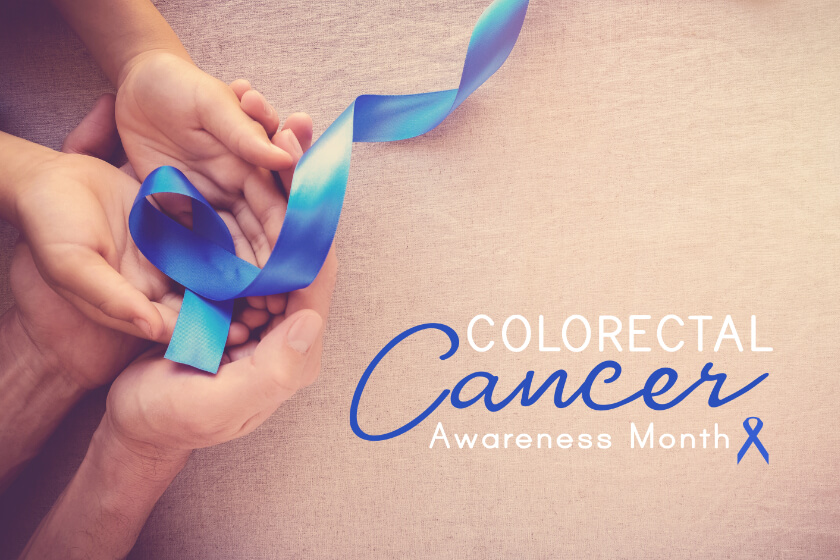
March is National Colorectal Cancer Awareness Month

March is National Colorectal Cancer Awareness Month
Held every March, National Colorectal Cancer Awareness Month provides a good opportunity to share important information about a common and potentially deadly form of cancer.
Colorectal cancer is a type of cancer that affects the colon and rectum. It is the third most common type of cancer in both men and women in the United States, according to the Centers for Disease Control and Prevention (CDC). Not counting skin cancer, colorectal cancer is also the third leading cause of cancer-related deaths in the nation.
Cancer screening helps doctors detect cancer in its earliest stages, when it is most responsive to treatment. Like other cancers, colorectal cancer starts as a few abnormal cells in lining of the colon, also known as the large intestine. As it progresses, the colorectal cancer cells begin to spread to the outer layers of the large intestine. In the later stages, the colorectal cancer cells spread to lymph nodes and other areas of the body. Because late-stage cancer can affect many parts of the body, it is usually harder to treat.
Colorectal cancer screening often focuses on polyps, which are small clumps of cells that form on the colon’s inner lining. While most polyps are harmless, some can develop into cancer over time.
The risk of colorectal cancer increases with age, so the American Cancer Society (ACS) recommends that people at average risk should begin regular screening at age 45 and that people who are in good health and expected to live another 10 years continue with screening until they are 75. The frequency of testing depends largely on the type of test.
Those with a higher risk may need screening more frequently. People are at higher risk if they have family history or personal history of certain types of polyps or colorectal cancer, have had Crohn’s disease or ulcerative colitis, a history of radiation to the belly or pelvis to treat cancer in the past, or a family history of certain hereditary syndromes.
National Colorectal Cancer Awareness month is an excellent time to learn about the various colorectal cancer screening tests now available. Some tests, such as occult blood and fecal immunochemical-based (FIT), look for hidden blood in the stool that can be a sign of cancer. Sigmoidoscopy and colonoscopy are minimally invasive procedures in which doctors use a flexible scope to examine the colon and rectum. Barium enemas involve injecting a special liquid into the rectum, where it coats the inside of the colon to make the large intestine – and any cancer or polyps – easier to see on an x-ray.
History of National Colorectal Cancer Awareness Month
The Prevent Cancer Foundation paved the way to designate March as National Colorectal Cancer Awareness Month. The foundation worked with legislators and other organizations the American Digestive Health Foundation and the National Colorectal Cancer Roundtable, to make the designation official. The U.S. Senate declared March as National Colorectal Cancer Awareness Month on November 19, 1999. The House of Representatives followed with a resolution shortly thereafter; the White House mad an official proclamation.
To raise awareness in the early days, the Foundation created “buddy bracelets” with the words, “Preventable. Treatable. Beatable!” printed upon them. Today, there are countless ways to raise awareness about colorectal cancer.
National Colorectal Cancer Awareness Month Now
Today, there are many more ways to bring awareness to colorectal cancer, and many more organizations doing that. Their efforts are paying off: the percentage of American adults ages 50 to 75 were up to date with their colorectal cancer screenings in 2018, which was up 1.4 percentage points from 2016. This works out to about 3.5 million more adults undergoing screening for colorectal cancer.
During March, the Colorectal Cancer Alliance (CCA) is trying to get 10,000 people to sign a pledge to undergo colorectal screening this year. Once they take the pledge, signers can access resources and reminders to undergo screening for colorectal cancer. CCA offers brochures to help spread the word about colorectal cancer awareness throughout the community. The alliance also offers ways for the public to get involved by sharing videos and graphics about National Colorectal Awareness Month online. Healthcare professionals and others can wear blue on March 5, 2021, also known as Dress in Blue Day.
The American Society of Colon and Rectal Surgeons (ASCRS) helps doctors spread the word about colorectal cancer by offering videos, brochures, and more on their website. ASCRS also offers suggestions to doctors, such as hosting open houses and educational seminars.
For more information on colorectal cancer or National Colorectal Cancer Awareness Month, speak to your doctor, gastroenterologist, or other healthcare professional. Spreading the word about this important event could save lives in your own community.




